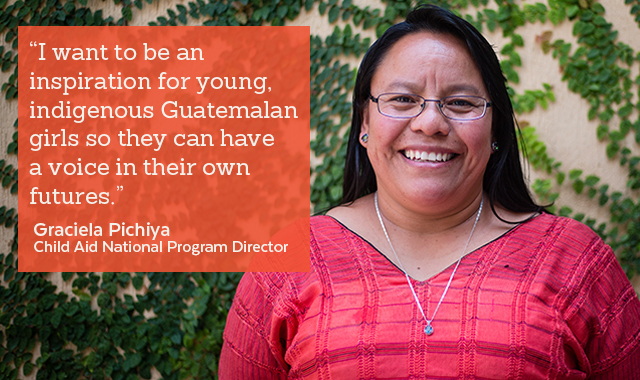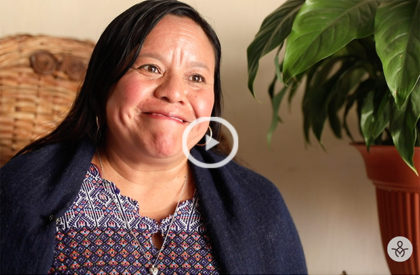
In honor of International Women’s Day 2019, Child Aid introduces our new National Program Director Graciela Landa Pichiya. A lawyer, educator, mother and proud indigenous Mayan woman, Graciela battled her way to get the education she wanted for herself. Today, Graciela fights for a quality education for the next generation of Guatemalan children. Here is her story:
“Only ugly, dumb girls join convents.” Her mother spit the words.
Graciela didn’t flinch. The young Guatemalan teenager knew what she wanted, and it was to become a nun.
“Learn to wash your clothes well, Graciela,” her mother instructed. “Learn to sweep well and to knit your own huipil (blouse). Your brother needs to study, but you should prepare to marry.”
At 13 years of age, Graciela Landa Pichiya had heard these sentiments all her life. Her mother’s admonitions sound harsh, but they reflect a reality for the poorest, most preyed upon people in this impoverished Central American nation.
Graciela’s childhood and young adult years were shrouded in an ugly 33 year-long civil war in which indigenous communities were targeted. Against this backdrop, a mother of a young, bright girl might panic at the thought of her daughter trying to live beyond the strict societal lines drawn for her.
But Graciela persisted. She’d learned early that men in her native Guatemala were given more opportunity to study. Indigenous women — arguably the most discriminated against population in the nation — simply married, bore children and relied on their husbands to support them, or not.
The convent would surely allow her to grow closer to God, but Graciela also knew she would be able to avoid marriage at a young age. Given the very limited life options Graciela faced, becoming a nun was an ingenious way forward. Perhaps she could also pursue the thing she most wanted: an education.

Graciela was hungry to read, though she’d received her very first story book, Cuentos para Patojos No. 6, only the year before. Graciela wanted to study medicine and the functions of the body. She was curious about science.
“Because I was a girl, I had to help my mother and had little time to do my homework. My brother was given all the time he needed to do his homework, and I knew this was not just my mother’s idea,” Graciela says, “but was normal for almost every family in my hometown.”
Graciela’s mother eventually relented, and the teenager became a nun, quickly assuming leadership roles, including running the financial administration of the convent and leading the training program for novitiates. She traveled into some of the poorest indigenous communities.
“In the convent, they never underestimated me,” Graciela recalls. She became used to the respect and admiration she received when she wore the traditional habit.
When she was 27 years-old, Graciela left the convent and entered secular society to teach. Graciela had loved being a nun, but she yearned to marry and to pursue a career. She also wanted to taste beer. So, Graciela began teaching primary school in Guatemala City where she found herself among people of a different and more broadly accepted ethnic background – the mestizo or ladino class. In this new environment, choosing to wear her traditional, indigenous garb, Graciela made a strong political statement of pride, and she proudly wore her indigenous traje (dress) to work as a teacher. She also suffered the consequences.
“I felt a lot of rejection,” she says.
When a parent of one of Graciela’s students asked the school principal to remove their child from Graciela’s class, the principal shrugged.
“Sorry Graciela,” he said. There are no teachers here like you, and those who dress like you are the ones selling vegetables in the market. People do not believe you are a teacher.”
Worse, Graciela faced abusive treatment from her school director, who shouted at her and treated her condescendingly.
“The confidence and self-assurance I gained in the convent had been lost. My self-esteem went down,” she says. “I was beginning to believe the mistreatment was normal. I even thought it was my punishment for having left Jesus. It was a very hard stage,” Graciela says.
But her darkest hour was also her new beginning.
“I must have the courage to stand and endure,” she thought to herself. “It was the starting point that made me reflect and make the decision to show everyone that an indigenous Mayan woman is as capable as any other woman in the world.”
Graciela enrolled in a university program to become a lawyer. She wanted to be able to advise indigenous women like herself of their rights. She wanted to empower herself and her people, and she wore her traditional traje to every class.
It wasn’t easy. Many times, Graciela was left out of group projects and had to pursue solitary work to meet the class requirements. Once, after making a presentation, Graciela’s professor said to her, in front of an entire class of mostly mestizo students, “since when do people like you know how to think?”
The indignities kept coming, but Graciela never stopped representing herself as what she is: a smart, capable and proud indigenous Mayan woman.
“I would have avoided so many uncomfortable moments,” Graciela admits when she talks about foregoing her traje for more contemporary mestiza clothing. “But I refuse to surrender easily to such a cruel society,” she says.
“I always think that my culture, my dress and my language are such treasures and should never be viewed, much less taught to girls, that they are a barrier that limit the Mayan woman from achieving her goals or dreams,” Graciela says. “I am a Maya Kaqchikel indigenous woman, and I feel very proud … and (by choosing every day to wear my traditional traje) I show that the system has not been able to, and will not be able to, change me, inside or out!”
Today, Graciela assumes a new role for Child Aid, a literacy nonprofit where she’s worked for more than a decade, first as a teacher trainer and most recently as a team manager. In her new role as National Program Director, Graciela will oversee the implementation of Child Aid’s long-term literacy program in more than 100 schools and supervise 20 employees.
“I can’t think of a more capable person to lead our organization’s ground operations in Guatemala than Graciela,” says Child Aid’s CEO Nancy Press. “Her eye for detail, deep knowledge of our program and impeccable leadership serves all of us well, especially the children of Guatemala.”
Today, Graciela’s work ensures thousands of elementary-age school children learn how to read, write and think critically about their world. It is a transformative role for a woman who believes in persistence.
“I think that if I hadn’t had excellent role models around me, I wouldn’t be able to say these things to the world now. I wouldn’t have been able to make my voice heard. I wouldn’t have been able to say to other women that we should keep pressing forward,” Graciela says. “But an educated and successful woman has the opportunity to assert her voice in society, to authorities, and in any situation.”
This International Women’s Day let’s listen and learn from wise women around the globe. When you teach a child to read, she can change her world for the better. Support our literacy efforts today.